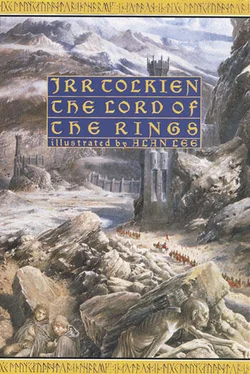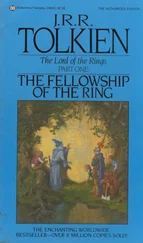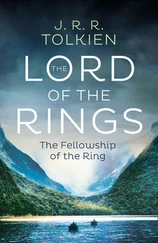Ents were, however, themselves skilled in tongues, learning them swiftly and never forgetting them. But they preferred the languages of the Eldar, and loved best the ancient High-elven tongue. The strange words and names that the Hobbits record as used by Treebeard and other Ents are thus Elvish, or fragments of Elf-speech strung together in Ent-fashion. [97]Some are Quenya: as Taurelilómëa-tumbalemorna Tumbaletaurëa Lómëanor, which may be rendered ‘Forestmanyshadowed-deepvalleyblack Deepvalleyforested Gloomy-land’, and by which Treebeard meant, more or less: ‘there is a black shadow in the deep dales of the forest’. Some are Sindarin: as Fangorn ‘beard-(of)-tree’, or Fimbrethil ‘slender-beech’.
Orcs and the Black Speech. Orc is the form of the name that other races had for this foul people as it was in the language of Rohan. In Sindarin it was orch. Related, no doubt, was the word uruk of the Black Speech, though this was applied as a rule only to the great soldier-orcs that at this time issued from Mordor and Isengard. The lesser kinds were called, especially by the Uruk-hai, snaga ‘slave’.
The Orcs were first bred by the Dark Power of the North in the Elder Days. It is said that they had no language of their own, but took what they could of other tongues and perverted it to their own liking; yet they made only brutal jargons, scarcely sufficient even for their own needs, unless it were for curses and abuse. And these creatures, being filled with malice, hating even their own kind, quickly developed as many barbarous dialects as there were groups or settlements of their race, so that their Orkish speech was of little use to them in intercourse between different tribes.
So it was that in the Third Age Orcs used for communication between breed and breed the Westron tongue; and many indeed of the older tribes, such as those that still lingered in the North and in the Misty Mountains, had long used the Westron as their native language, though in such a fashion as to make it hardly less unlovely than Orkish. In this jargon tark, ‘man of Gondor’, was a debased form of tarkil , a Quenya word used in Westron for one of Númenorean descent; see p. 906.
It is said that the Black Speech was devised by Sauron in the Dark Years, and that he had desired to make it the language of all those that served him, but he failed in that purpose. From the Black Speech, however, were derived many of the words that were in the Third Age wide-spread among the Orcs, such as ghâsh ‘fire’, but after the first overthrow of Sauron this language in its ancient form was forgotten by all but the Nazgûl. When Sauron arose again, it became once more the language of Barad-dûr and of the captains of Mordor. The inscription on the Ring was in the ancient Black Speech, while the curse of the Mordor-orc on p. 445was in the more debased form used by the soldiers of the Dark Tower, of whom Grishnákh was the captain. Sharkû in that tongue means old man.
Trolls. Troll has been used to translate the Sindarin Torog. In their beginning far back in the twilight of the Elder Days, these were creatures of dull and lumpish nature and had no more language than beasts. But Sauron had made use of them, teaching them what little they could learn and increasing their wits with wickedness. Trolls therefore took such language as they could master from the Orcs; and in the Westlands the Stone-trolls spoke a debased form of the Common Speech.
But at the end of the Third Age a troll-race not before seen appeared in southern Mirkwood and in the mountain borders of Mordor. Olog-hai they were called in the Black Speech. That Sauron bred them none doubted, though from what stock was not known. Some held that they were not Trolls but giant Orcs; but the Olog-hai were in fashion of body and mind quite unlike even the largest of Orc-kind, whom they far surpassed in size and power. Trolls they were, but filled with the evil will of their master: a fell race, strong, agile, fierce and cunning, but harder than stone. Unlike the older race of the Twilight they could endure the Sun, so long as the will of Sauron held sway over them. They spoke little, and the only tongue that they knew was the Black Speech of Barad-dûr.
Dwarves. The Dwarves are a race apart. Of their strange beginning, and why they are both like and unlike Elves and Men, the Silmarillion tells; but of this tale the lesser Elves of Middle-earth had no knowledge, while the tales of later Men are confused with memories of other races.
They are a tough, thrawn race for the most part, secretive, laborious, retentive of the memory of injuries (and of benefits), lovers of stone, of gems, of things that take shape under the hands of the craftsman rather than things that live by their own life. But they are not evil by nature, and few ever served the Enemy of free will, whatever the tales of Men may have alleged. For Men of old lusted after their wealth and the work of their hands, and there has been enmity between the races.
But in the Third Age close friendship still was found in many places between Men and Dwarves; and it was according to the nature of the Dwarves that, travelling and labouring and trading about the lands, as they did after the destruction of their ancient mansions, they should use the languages of Men among whom they dwelt. Yet in secret (a secret which unlike the Elves, they did not willingly unlock, even to their friends) they used their own strange tongue, changed little by the years; for it had become a tongue of lore rather than a cradle-speech, and they tended it and guarded it as a treasure of the past. Few of other race have succeeded in learning it. In this history it appears only in such place-names as Gimli revealed to his companions; and in the battle-cry which he uttered in the siege of the Hornburg. That at least was not secret, and had been heard on many a field since the world was young. Baruk Khazâd! Khazâd ai-mânu! ‘ Axes of the Dwarves! The Dwarves are upon you!’
Gimli’s own name, however, and the names of all his kin, are of Northern (Mannish) origin. Their own secret and ‘inner’ names, their true names, the Dwarves have never revealed to anyone of alien race. Not even on their tombs do they inscribe them.
II ON TRANSLATION
In presenting the matter of the Red Book, as a history for people of today to read, the whole of the linguistic setting has been translated as far as possible into terms of our own times. Only the languages alien to the Common Speech have been left in their original form; but these appear mainly in the names of persons and places.
The Common Speech, as the language of the Hobbits and their narratives, has inevitably been turned into modern English. In the process the difference between the varieties observable in the use of the Westron has been lessened. Some attempt has been made to represent varieties by variations in the kind of English used; but the divergence between the pronunciation and idiom of the Shire and the Westron tongue in the mouths of the Elves or of the high men of Gondor was greater than has been shown in this book. Hobbits indeed spoke for the most part a rustic dialect, whereas in Gondor and Rohan a more antique language was used, more formal and more terse.
One point in the divergence may here be noted, since, though important, it has proved impossible to represent. The Westron tongue made in the pronouns of the second person (and often also in those of the third) a distinction, independent of number, between ‘familiar’ and ‘deferential’ forms. It was, however, one of the peculiarities of Shire-usage that the deferential forms had gone out of colloquial use. They lingered only among the villagers, especially of the Westfarthing, who used them as endearments. This was one of the things referred to when people of Gondor spoke of the strangeness of Hobbit-speech. Peregrin Took, for instance, in his first few days in Minas Tirith used the familiar for people of all ranks, including the Lord Denethor himself. This may have amused the aged Steward, but it must have astonished his servants. No doubt this free use of the familiar forms helped to spread the popular rumour that Peregrin was a person of very high rank in his own country. [98]
Читать дальше
Конец ознакомительного отрывка
Купить книгу












